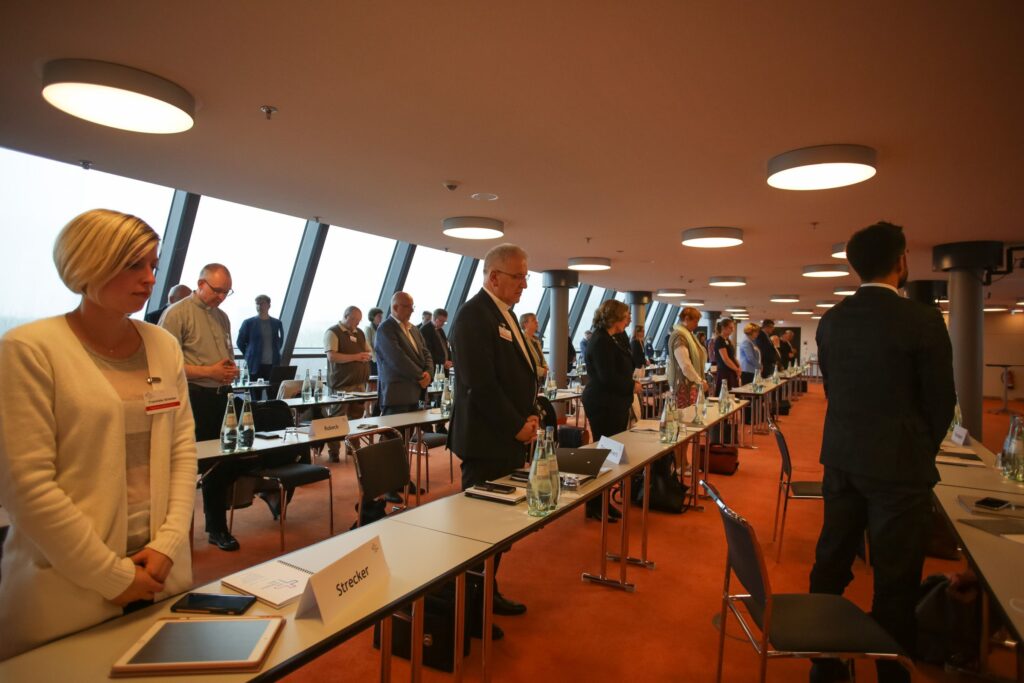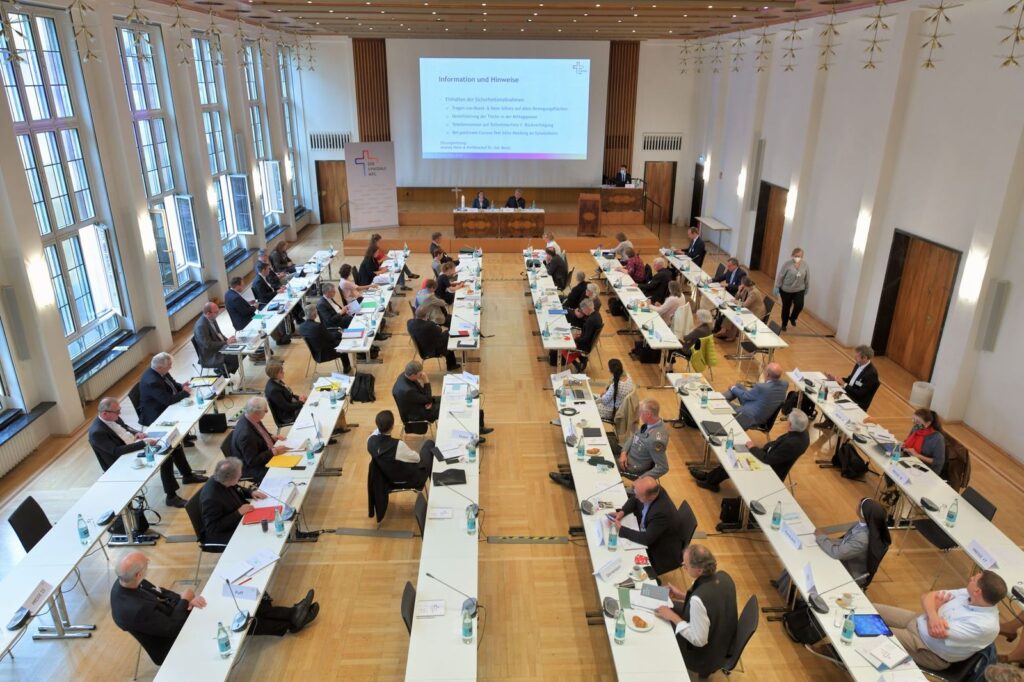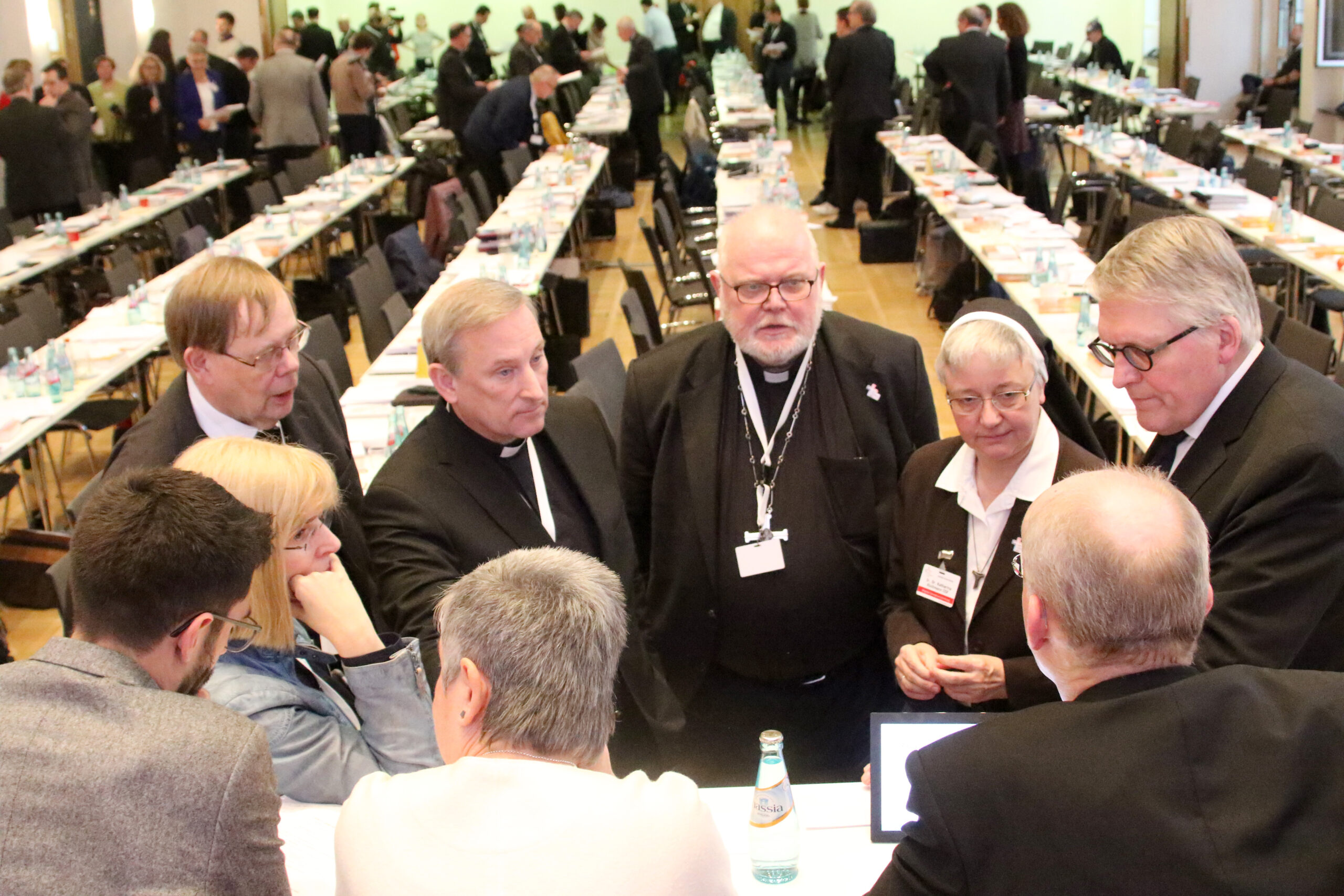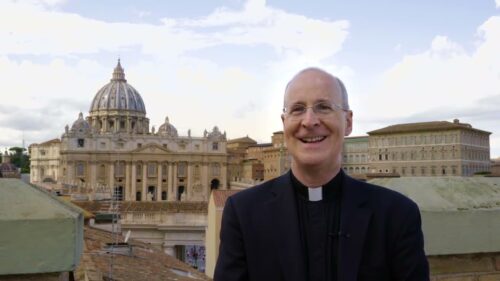“Everything was already said in Würzburg!”
We Germans, who have been on the Synodal Path since the end of 2019, often hear this reminder. In fact, at the joint synod of the German dioceses convened in Würzburg, Bavaria, between 1971 and 1975, 18 resolutions were passed on many different sets of topics. Some demands were implemented, while others were delegated to Rome and remain unanswered to this day.
But, if you look up the themes and the reform concerns of the Synodal Path in the documentation of the Würzburg Synod, it is noticeable that by no means “everything” has already been said (and decided).
An equivalent to the current synod’s working text entitled “Official Reassessment of Homosexuality” cannot be found in the Würzburg text, because the noun “homosexuality” did not appear even once in the almost 800 pages. One can conclude from the Würzburg appendix that, in the preliminary phase of settling on a topic within the general theme of “marriage and family,” questions about “sexuality before and outside of marriage and homosexuality” were discussed, but apparently they did not find their way into the final deliberations of the synod.
The following anthropological presuppositions were postulated at the time: “It is good that you exist … In the sexual encounter, love in a partnership acquires its own bodily-sensual expression. The joy in a spouse, the will to be there for one another and to be loyal to one another, can be experienced in sexual encounters.” On the importance of sexuality in marriage and family, the synod said: “Sexuality is one of the forces that determine human existence.”
This reticence—not only among Catholics, but within 1970s German society in general—has given way to a style of discussion that takes the Würzburg considerations one step further. At least that’s how I understand the Synodal Path. This is a conscious statement against the current Catholic catechism, which has been critical and disparaging of homosexuality since the mid-1970s and still reproaches homosexual activity as sin.
Meanwhile, the magisterium has recognized that homosexuality is an orientation—not something chosen. Catholics are increasingly being pushed into cognitive dissonance if they seriously try to reconcile official church positions on homosexuality with their own real lives. For children and young people today, it is completely normal to be confronted with queer identities among fellow students, teachers and friends.
“This is a conscious statement against the current Catholic catechism, which has been critical and disparaging of homosexuality since the mid-1970s and still reproaches it as sin.”
So, it is only logical that the “basic text” of the responsible synodal forum (i.e., the text that forms the theological framework around the more practical texts on questions of sexuality and partnership), demands a clear readjustment. Here is an example from the “basic text” that was discussed: “The recognition of the equality and legitimacy of non-heterosexual orientations, their practices and relationships, as well as the elimination of discrimination based on sexual orientation, is urgently required.”
From the perspective of society as a whole, “long overdue” would also be an appropriate formulation. Gay and straight relationships strive for the same values and face the same challenges: fidelity and permanence on the one hand, and alienation and declining desire on the other. All couples experience success and failure, and regardless of their sexual orientation, the church should always stand by their side to support them and convey a message of welcome.

The church must claim to be a home for all people. Discrimination and homophobia can have no place where people want to feel safe. Queer Christians do not want to be treated like this, and heterosexual Christians do not feel represented by a church that presents itself in this way.
Such a change in the position of the magisterium cannot take place in a local church, but it can give it an important impetus. For this reason, the synodal assembly in September will discuss a text that recommends that the pope examine more precisely and reassess church doctrine on homosexuality.
“Every human being was created by God with his sexuality and … this created being has an inviolable dignity. Sexual orientation is an inseparable part of every human person. It is not self-chosen and it cannot be changed,” says the proposed text. It could be argued that this makes up for what has long since found its way into the Old Testament with the 2016 common translation of the Bible.
It is no longer written “man and wife he created them,” but rather “male and female he created them” (Gen 1:27). As a matter of creation theology, this marks the fact that sexual identity is more complex than a purely biological understanding.
#OutInChurch
While the Synodal Path, according to its self-understanding, deals with the systemic causes of sexual abuse and its cover-ups, countering them with concrete demands for reform, other initiatives have additionally energized the discourse in the German local church. Especially conspicuous is the #OutInChurch campaign, which was launched in January 2022 by 125 queer Catholics who themselves were (or are) in the service of the church.
By means of personal testimonials and a television documentary, they drew attention to their concerns. Their demands include self-evident matters: “As LGBTIQ+ people we want to be able to live and work openly in the church without fear.” They denounce discrimination in certain professions and in the church, defamatory teaching on sex, the lack of blessing for queer people and couples and the denial of sacraments. And they call on the church to face its own responsibility and guilt.
“All couples experience success and failure, and regardless of their sexual orientation, the church should always stand by their side to support them and convey a message of welcome.”
The reaction was immense. In the first half of the year, the documentary, which is available online, received the most clicks of all programs in the ARD media library, and the media reported intensively on a national and regional level. German public conversation quickly focused on the most practical of the demands: a revision of church labor law and an abolition of the duties of loyalty formulated therein, which are particularly controversial because of the questionable nature of the individual’s own relationship status.
This is something that many employers, in an informal fashion, had long since broken with, having simply ignored “deviations” on the part of potential employees. Although a majority of diocesan vicars general quickly spoke up and announced the suspension of the basic order, a legally binding implementation of a revised Catholic labor law is still pending. This should be in place by autumn. We will see whether all dioceses will adopt this new version.
The Catholic Church in Germany, both directly and indirectly, employs 750,000 people. With the implementation of this new labor law, bishops can prove how important including queer employees is to them. It would be a strong sign against discrimination and homophobia. No one wants to be subject to the arbitrary decisions of individual managers, and no one should fear potential changes at the management level.

Through the #OutInChurch campaign, 125 people have publicly come out. However, many people do not dare take this step because there is no culture of welcome; they simply do not have enough trust in the professional environment to reveal their own identity. Changing laws is not enough to achieve this broader acceptance. It requires a process of change that must provide mandatory training for employees and employers.
Also, the local German church should not make itself smaller than it is. It may be that, in other parts of the world, a church review of Catholic sexual teaching is not a top priority. But a global campaign for human rights in order to lead a self-determined life without restrictions should have top priority for the German local church. It is not without reason that the work of our Catholic relief organizations and campaigns is an important pillar of the German church. In this way, a contribution can be made to naming homophobia and discrimination as such and to fighting conversion therapies.
People should not underestimate these actions, especially in countries whose governments continue to recognize church authorities. We are not only talking only about the Global South, as European Union members, with whom we form a community of values, also discriminate against queer people by law and with church support. Here, the German local church must be loud, demanding and progressive. Such a commitment is already open to the bishops.
Even if I am convinced that the majority of the synodal assembly will speak out in favor of a revision of the church’s catechism, as I described above, such a decision is not a prerequisite for the German episcopacy to influence the universal church.
It is often heard that the church should enable “safe spaces,” where queerness can be lived, free from discrimination and the pressure to justify itself. From my point of view, such safe spaces can be only an intermediate step. The church as a whole must be a safe space in order to meet people with different sexual identities. LGBTQ people are— like all Christians—a blessing for the community. Or, in the words of the Würzburg Synod: “It is good that you exist.”
This article, edited for length and clarity, was translated from the German by Robert C. Collins, S.J. The original German-language version can be found here.



